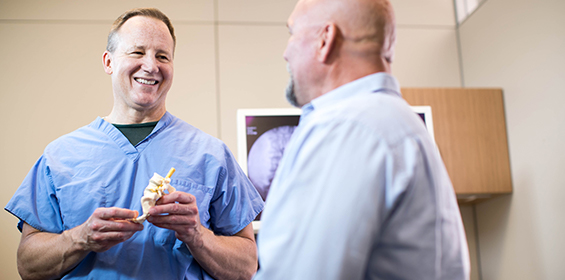We recently kicked off National Pain Awareness Month by sharing conservative treatment methods that aid in temporary pain relief for chronic pain. In this post, we will take a deeper dive into chronic pain of the back, neck and shoulder and surgical options available.
For many experiencing chronic pain caused by arthritis, pain can only be managed conservatively for so long until surgery is recommended. Thankfully, there are surgical treatments available to relieve chronic pain from arthritis in the neck, back and shoulder.
Arthritis of the Neck and Lower Back
When it comes to the spine, arthritis is most common in the lumbar spine (lower back) and cervical spine (neck). Arthritis in the lower back or neck (lumbar or cervical spondylosis) is caused by the discs and joints degenerating over time. As discs degenerate, they lose cushioning (or cartilage) between the discs.
Arthritis of the spine is most commonly an age-related issue. We all age at different rates, and our spines are no different. Genetics plays a large role, but so does trauma and the type of injuries or stresses our spines have been exposed to over the years. As an example, a dentist may work with their neck craned in an awkward position all day, which may likely lead to an injury to the joints in the neck. Smoking also leads to accelerated degeneration and arthritis of the spine.
Surgery is usually reserved for compression of the nerves in the neck or lower back or compression of the spinal cord in the neck. However, you may be a candidate for surgery if you are experiencing any of the following symptoms:
- Numbness and/or weakness in your arms, legs, hands, feet or fingers
- Difficulty walking for any distance associated with leg weakness or a heavy feeling
- Difficulty balancing due to spinal cord compression associated with numbness in your arms or hands
- Shooting pain and numbness from your neck or back down your arm or leg
To consult with a neck and spine surgeon at Central Indiana Orthopedics, please request an appointment online or call 800-622-6575.
Arthritis of the Shoulder
Shoulder arthritis can cause pain, inflammation and stiffness. The shoulder is a ball-and-socket joint, the humerus (the humeral head being the “ball”) and the socket (part of the scaptila or shoulder blade). Arthritis damages the smooth outer coverage (cartilage) of the bone, and as it wears away over time, the space between the bones decreases. Think of healthy cartilage as the end of a chicken leg – smooth and shiny. Arthritis causes that smooth, shiny cartilage to become rough and fragmented. During movement, the bones in the joint rub against each other (often called “bone-on-bone”) causing pain, weakness and limited mobility.
There are two areas of the shoulder that can be affected by arthritis – the acromioclavicular joint (or “AC joint”) and the glenohumeral joint. Your orthopedic surgeon will work with you to determine the source of the arthritis and which joint is affected before determining the proper treatment plan.
Shoulder Arthroscopy
Patients with mild shoulder arthritis may be candidates for a shoulder arthroscopy. Shoulder arthroscopy, or “shoulder scope,” is a minimally invasive procedure used to examine, diagnose and treat the source of shoulder pain. During a shoulder arthroscopy, an orthopedic surgeon makes small incisions at the shoulder and inserts a small camera called an arthroscope, as well as other surgical tools to perform the procedure, to examine the inside of the shoulder joint. Arthroscopy is commonly performed in an outpatient setting, allowing patients to go home the same day. Patients typically experience less pain and a quicker recovery with an arthroscopic procedure, in contrast to open surgery.
Shoulder Replacement
In cases where more advanced arthritis is present, a joint replacement may be recommended. In a total shoulder replacement, the ball of the humerus (or “humeral head”) is replaced with a metal ball attached to a stem which is inserted into the shaft of the humerus. In many cases, the socket is also replaced with a plastic piece fixed in the socket.
You may be a candidate for shoulder surgery if you are experiencing any of the following symptoms:
- Pain in the joint that keeps you awake at night
- Joint discomfort that prevents you from participating in recreational activities
- Joint pain that limits your ability to conduct necessary daily functions
- You have attempted more conservative treatment methods, such as exercise, injections or therapy, without success
To consult with a shoulder surgeon at Central Indiana Orthopedics, please request an appointment online or call 800-622-6575.
In the coming weeks, we will continue our discussion on pain awareness and treating chronic pain of the hip and knee.

